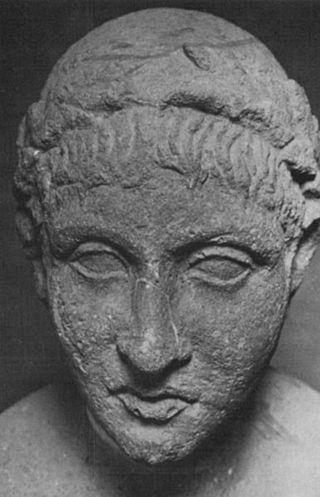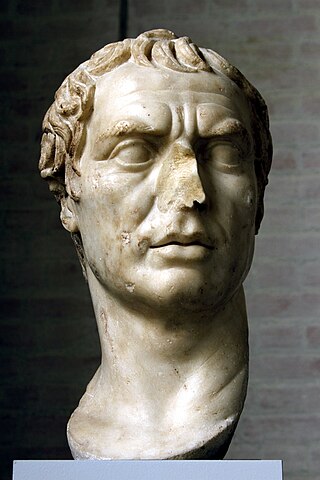Publius Cornelius Scipio may refer to:
This article concerns the period 149 BC – 140 BC.
Gnaeus Cornelius Scipio Calvus was a Roman general and statesman during the third century BC. He played a major part in the Second Punic War establishing Roman Rule in the east of the Iberian Peninsula and tying up several Carthaginian armies keeping them from reinforcing Hannibal.

Lucius Cornelius Scipio Asiaticus was a general and statesman of the Roman Republic. He was the son of Publius Cornelius Scipio and the younger brother of Scipio Africanus. He was elected consul in 190 BC, and later that year led the Roman forces to victory at the Battle of Magnesia.
Scipio Africanus was a Roman general who defeated his Carthaginian counterpart Hannibal.
Publius Cornelius Scipio Nasica Serapio was a Roman politician. He is most well known for mobilising the mob which killed Tiberius Gracchus, who was at the time attempting to stand for re-election as plebeian tribune in 133 BC. He was consul in 138 BC and served as pontifex maximus, from possibly 141 through to his death in 132 BC.
Scipio Nasica was the name of several members of the Scipiones, a branch of the patrician Roman gens Cornelia. Metellus Scipio was born into this family, but was later adopted out to the gens Caecilia. He still retained his former name by combining it with that of his adoptive father.

Quintus Caecilius Metellus Macedonicus was a statesman and general of the Roman Republic during the second century BC. He was praetor in 148 BC, consul in 143 BC, the Proconsul of Hispania Citerior in 142 BC and censor in 131 BC. He got his agnomen, Macedonicus, for his victory over the Macedonians in the Fourth Macedonian War.

The gens Cornelia was one of the greatest patrician houses at ancient Rome. For more than seven hundred years, from the early decades of the Republic to the third century AD, the Cornelii produced more eminent statesmen and generals than any other gens. At least seventy-five consuls under the Republic were members of this family, beginning with Servius Cornelius Maluginensis in 485 BC. Together with the Aemilii, Claudii, Fabii, Manlii, and Valerii, the Cornelii were almost certainly numbered among the gentes maiores, the most important and powerful families of Rome, who for centuries dominated the Republican magistracies. All of the major branches of the Cornelian gens were patrician, but there were also plebeian Cornelii, at least some of whom were descended from freedmen.

Publius Cornelius Scipio Nasica Corculum was a politician of the Roman Republic. Born into the illustrious family of the Cornelii Scipiones, he was one of the most important Roman statesmen of the second century BC, being consul two times in 162 and 155 BC, censor in 159 BC, pontifex maximus in 150 BC, and finally princeps senatus in 147 BC.
Aemilia Tertia, properly Aemilia, was the wife of Scipio Africanus.
Publius Cornelius P.f. P.n. Scipio was the eldest son of Scipio Africanus and his wife Aemilia Paulla. He was chosen augur from 180 BC. Little information on him survives, as he did not stand for any of the high offices or have a public career of note. Cicero relates that he was in poor health, the particulars of which he refuses to mention, stating that "we ought not to reproduce ... their faults ." Scipio died young from his poor health.
Gaius Laelius Sapiens, was a Roman statesman, best known for his friendship with the Roman general and statesman Scipio Aemilianus. He was consul of 140 BC, elected with the help of his friend, by then censor, after failing to be elected in 141 BC. Gaius Laelius Sapiens was the son and heir of the Punic War general Gaius Laelius, himself consul in 190 BC. This Laelius had been former second-in-command and long-time friend, since childhood, of the Roman general and statesman Scipio Africanus. The younger Laelius was apparently born around 188 BC, after his father had become consul but had failed to win command of the campaign against Antiochus III the Great of Syria, which would have made him a rich man. His mother's name is unknown.
Aemilianus can refer to a number of people in Classical history:

Quintus Caecilius Metellus Pius Scipio, often referred to as Metellus Scipio, was a Roman senator and military commander. During the civil war between Julius Caesar and the senatorial faction led by Pompey, he was a staunch supporter of the latter. He led troops against Caesar's forces, mainly in the battles of Pharsalus and Thapsus, where he was defeated. He later committed suicide. Ronald Syme called him "the last Scipio of any consequence in Roman history."
Publius Cornelius Scipio Nasica was a politician of the Roman Republic. He belonged to the great patrician family of the Cornelii Scipiones, and was the son of the pontifex maximus Nasica Serapio, who famously murdered Tiberius Gracchus in 133 BC. Nasica was on track to a prestigious career like most of his ancestors, being praetor in 118 BC, but he died during his consulship in 111 BC.

Publius Cornelius Scipio Africanus was a Roman general and statesman, most notable as one of the main architects of Rome's victory against Carthage in the Second Punic War. Often regarded as one of the greatest military commanders and strategists of all time, his greatest military achievement was the defeat of Hannibal at the Battle of Zama in 202 BC. This victory in Africa earned him the honorific epithet Africanus, literally meaning "the African," but meant to be understood as a conqueror of Africa.
The Scipionic Circle, or the Circle of Scipio, was a group of philosophers, poets, and politicians patronized by their namesake, Scipio Aemilianus. Together they would discuss Greek culture, literature, and humanism. Alongside their philhellenic disposition, the group also had a more humane Roman foreign policy. The term was first derived during the 19th century and ubiquitously adopted by scholars of the early 20th century. The collection of members varied during its existence, from 15 names of the early period, to 27 in its middle to 10 in its final.

Publius Cornelius Scipio was a priest of the Roman Republic, who belonged to the prominent family of the Cornelii Scipiones. He was the grandson of Scipio Africanus and son of P. Cornelius Scipio. He is only known from an inscription found in the Tomb of the Scipios, which tells that he was flamen Dialis, the prestigious priest of Jupiter.